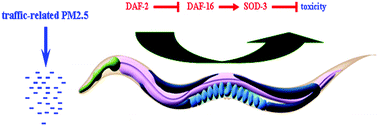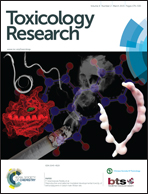Insulin signaling regulates the toxicity of traffic-related PM2.5 on intestinal development and function in nematode Caenorhabditis elegans†
Abstract
Our previous study has demonstrated the adverse effects of traffic-related PM2.5 on Caenorhabditis elegans, a non-mammalian toxicological model. In this study, we employed the methods of genetics, gene expression pattern, intestinal autofluorescence, oxidative stress, and intestinal permeability to investigate the molecular control of in vivo toxicity from traffic-related PM2.5 by the insulin signaling pathway in nematodes. Among genes encoding the insulin signaling pathway, prolonged exposure to PM2.5 caused a decrease in the expression levels of daf-16 and daf-18 genes and an increase in the expression levels of daf-2, akt-1, and pdk-1 genes. Meanwhile, PM2.5 exposure increased the DAF-16::GFP nuclear localization. Mutations of the daf-2 gene encoding the insulin receptor restored deficits in both intestinal development and intestinal function in PM2.5 exposed nematodes. In contrast, mutations of the daf-16 gene encoding the FOXO transcription factor caused more severe damage on both intestinal development and intestinal function in PM2.5 exposed nematodes. Moreover, DAF-16 might regulate the toxicity of PM2.5 on the intestine through the functions of its downstream targets such as SOD-3, a manganese-superoxide dismutase. Therefore, the insulin signaling pathway may act as an important molecular basis for the toxicity of traffic-related PM2.5 in nematodes.


 Please wait while we load your content...
Please wait while we load your content...